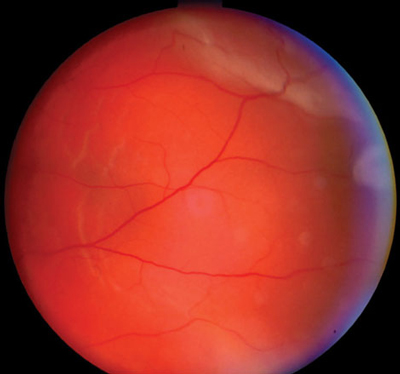While some patients understand and are diligent about returning for additional medical testing the doctor deems necessary, unfortunately, many patients are not as receptive. We recently encountered such a patient.
 The patient was educated about the importance of returning for additional testing specific to her medical condition, but ignored the doctor’s recommendation. Although the patient was told many times that she had macular changes, she did not return. A few months later, she called the office for an emergency visit. She spoke with the medical receptionist and described an alarming visual experience she had a few days before. She described it as “seeming like a curtain had gone over my vision in the left eye. It was a very strange and disorienting experience that left me feeling upset, confused, and very concerned for my well-being.” The receptionist told the patient to come in immediately for an emergency exam and consultation regarding the incident. The doctor was informed of the situation and ordered retinal photos for further examination. When the patient arrived, the technician consulted with the patient and took meticulous notes about the incident, asking her to describe the situation in as much detail as possible. The technician documented the patient’s account of the experience, and took the new round of retinal photos. The patient then went to the exam room where she met with the doctor who reviewed her chart and testing results. He informed her of an almost full retinal detachment. The situation could not have been more serious. The patient needed an emergency visit with a retinal specialist. Understandably, she was emotional and upset.
The patient was educated about the importance of returning for additional testing specific to her medical condition, but ignored the doctor’s recommendation. Although the patient was told many times that she had macular changes, she did not return. A few months later, she called the office for an emergency visit. She spoke with the medical receptionist and described an alarming visual experience she had a few days before. She described it as “seeming like a curtain had gone over my vision in the left eye. It was a very strange and disorienting experience that left me feeling upset, confused, and very concerned for my well-being.” The receptionist told the patient to come in immediately for an emergency exam and consultation regarding the incident. The doctor was informed of the situation and ordered retinal photos for further examination. When the patient arrived, the technician consulted with the patient and took meticulous notes about the incident, asking her to describe the situation in as much detail as possible. The technician documented the patient’s account of the experience, and took the new round of retinal photos. The patient then went to the exam room where she met with the doctor who reviewed her chart and testing results. He informed her of an almost full retinal detachment. The situation could not have been more serious. The patient needed an emergency visit with a retinal specialist. Understandably, she was emotional and upset.Had the patient been more proactive and persistent regarding her medical condition, this unfortunate outcome could have been averted. She lost more than 60% of vision in that eye, even after many injections into her macula. Her vision will never be the same.
The scribe’s documentation is an important part of this story. Although the patient’s condition can be connected to her lax approach to her health, the flip side of the coin rests with the scribe’s ability to document the situation accurately and with as much detail as possible. Accuracy and detail are critical to making treatment decisions as well as protecting the practice.
Though this particular patient was very grateful that we helped save a portion of her vision, some patients might want to blame someone for their misfortune. . Documentation in today’s medical practice can never be taken lightly. All charts and patient histories must be accurate and have the level of detail that helps mitigate not only patient emergencies, but also helps the practice avoid liability.













